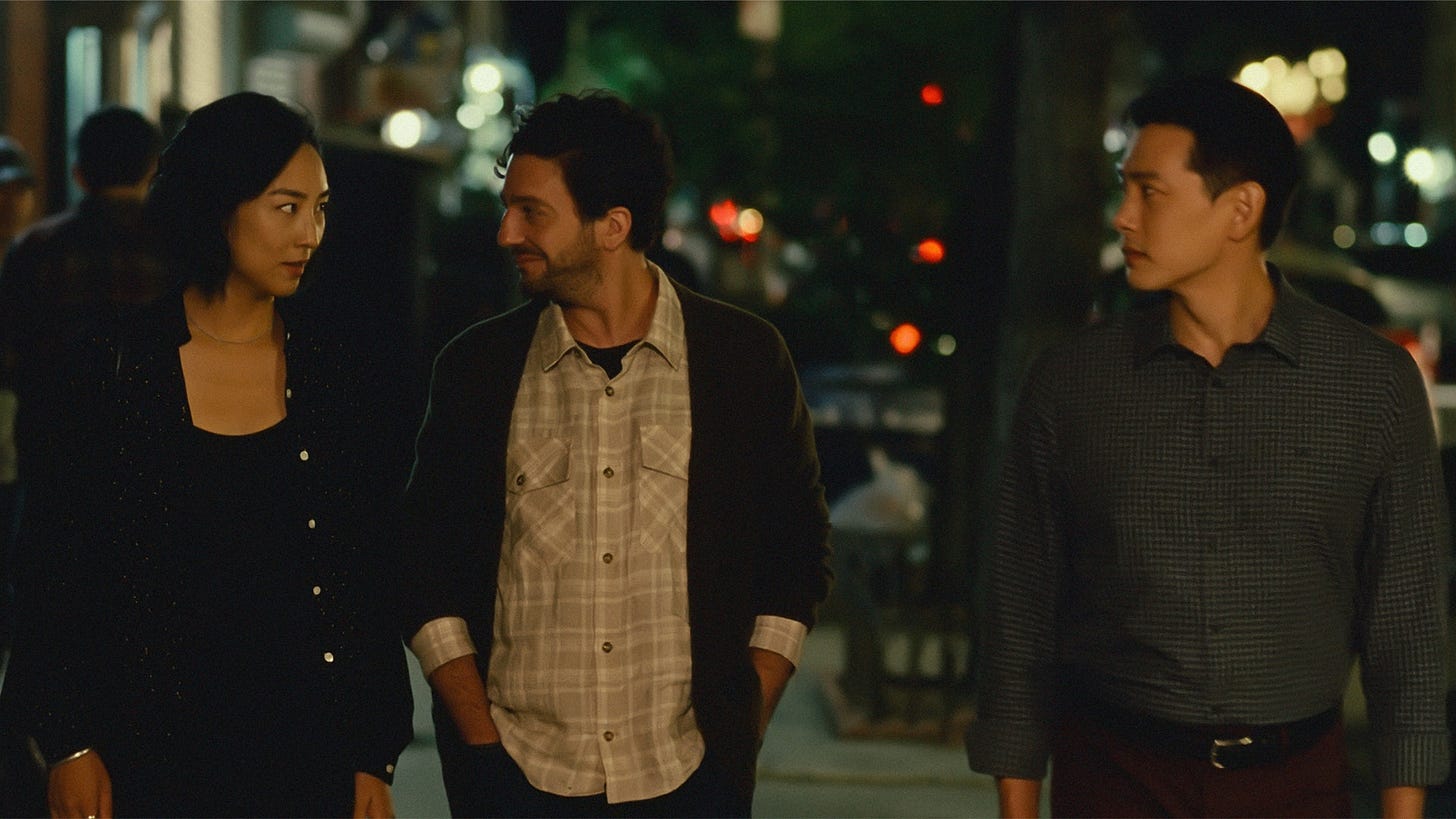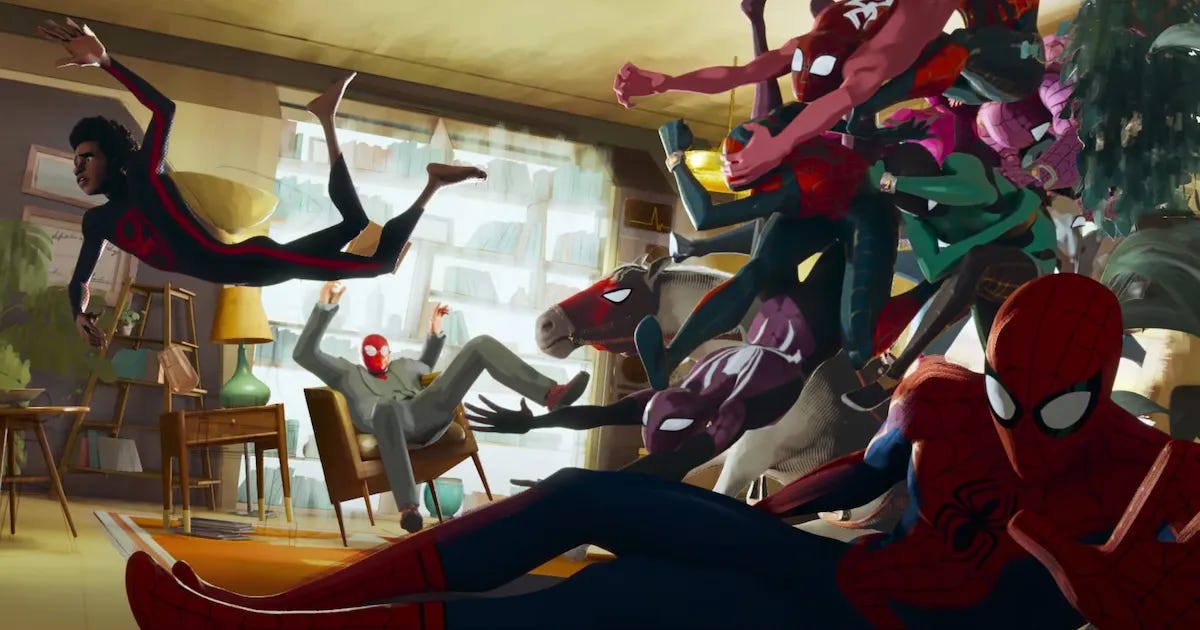What To Watch: "Past Lives," Present Sins
A luminous almost-love story and a disappointing Spidey sequel come to theaters.
One of the year’s very best movies – I’m confident I’ll still be saying that in December – opens in limited release today before going wider next week. Also in theaters: A blockbuster let-down that’s going to make pots of money anyway.
The good one first: I first saw “Past Lives” (⭐ ⭐ ⭐ ⭐) at Sundance in January and wrote about it then; I’m re-running the bulk of the review below because I felt it captured the quiet rapture with which Celine Song’s debut feature was greeted by a normally hardhearted Park City press crowd. (Also because I’m lazy.) When you hear people talking about it on the shuttle buses and the waiting lines, I wrote back then, they don’t sound excited – they sound thankful.
The plot is so simple it’s barely there. In 1999 Seoul, two 12-year-old South Korean classmates, Na Young and Hae Sung, develop a schoolyard crush on each other just as Na Young’s family is set to emigrate to Canada. Twelve years later, Na Young is a struggling New York City playwright named Nora (Greta Lee, above right) who reconnects with Hae Sung (Teo Yoo, above left) over the Internet; they share a Skype friendship that blossoms over the course of several months until Nora gets cold feet and pulls the plug. Twelve years after that, Hae Sung comes to Manhattan on vacation and visits Nora and her novelist husband Arthur (John Magaro).
That’s it, that’s all, yet within that “all” is everything – the roads you didn’t take versus the one you did, the life you’re living versus the many you might have had. The people and the love you could have chosen, although hovering in the background of “Past Lives” is the sense that we’re not doing the choosing at all — that something bigger and just out of sight is at the wheel. The title is taken from a belief in many Asian cultures that your life partner is one with whom you’ve shared previous lives; in Korea, this notion of fate is called In-Yun, and the movie’s characters ponder it at length. Nora explains it to Arthur when they’re first falling for each other at a writer’s retreat; twelve years later, Hae Sung is fresh from a breakup with a longtime girlfriend and wondering whether his In-Yun somehow got misplaced and ended up 7,000 miles away in a foreign city.
“Past Lives” is based on events in the director’s own life, and it has the quiet impact of home truths. The scenes between Nora and Arthur hum with warm, worn domestic comfort; a late-night conversation between the two in bed, lit by the gray half-light of a 2 a.m. city apartment, is one of the film’s emotional hinge points, as Arthur talks of his trust in the strength of what they have and his insecurity that it could go away at any moment. He knows that in the movie of this story, he’d be the villain the audience roots to see left behind. He knows that when Nora talks in her sleep, it’s in Korean, a hint of the Na Young that Hae Sung knows and Arthur never will.
Magaro (“First Cow”) and Yoo (“Decision to Leave”) are both terrific, but this is Greta Lee’s movie. The actress has had a busy career, mostly in TV: She played the network news president on “The Morning Show” and the best friend on “Russian Doll.” As Nora, she exudes a breezy confidence that over the course of the film is eroded by all the what-ifs that Hae Sung represents and that reveal to her – and to Arthur, and to us – the vastness of the unknown over which we skate. “Past Lives” easily manages the trick of being specific and universal at the same time, but it’s such a delicate piece of work that I worry it’ll get drowned out in the world beyond Park City. What gives me hope is the way it has already united the tough Sundance crowd into a grateful, snurfly mass. A critic colleague recalled a dictum from the late Roger Ebert, and that’s as good a place as any to leave this: The best movies that make you cry are not the ones about sadness. They’re the ones about goodness.
I had a chance to revisit “Past Lives” this week and stand by the words above. It’s rare that a movie draws one’s attention to the small sorrows and joys of daily life and by that attention reveals how immense they actually are. It’s rarer still that a moviemaker can sketch in whole lives with such a light touch – the characters here are reticent, inherently kind, fumbling their way toward grace, but Song lets us see the emotions luminescing away just beneath their skins. The film opens with a scene of Nora, Arthur, and Hae Sung sitting at a New York bar together while an offscreen man and woman – a random couple across the way – play a guessing game on the soundtrack: Are the two Asians brother and sister? Lovers? What’s the white guy doing there? By the time Song brings us back to the scene toward the end of “Past Lives,” we understand there’s so much more to these people and to the bonds of love and longing that bind them than that couple will ever know. It’s a film to make you look at strangers on the street with fresh tenderness and curiosity, and if it makes you pause to contemplate the In-Yun of your own past lives, so much the better.
I know this newsletter generally tacks away from the superhero/comic book/film franchise universe, and I’m guessing a fair amount of my subscribers are okay with that, but if you’ve never seen “Spider-Man: Into the Spider-Verse” – that’s the 2018 animated one – I urge you to reconsider. I gave it the full four stars when I reviewed it for the Globe, and it remains a knockout: Deliriously inventive, visually astounding, funny as hell – just an all-around delight. I knew we’d get a sequel eventually, but I didn’t expect them to suck most of the joy out of it. “Spider-Man: Across The Spider-Verse” (⭐ ⭐) still has a visual creativity that’s off the charts: At its best, the movie looks like an explosion in a Pop Art museum; at its worst like a graphic design app with every last setting cranked to 11. When the movie slows down to breathe, it can exhilarate you with a wistful two-character scene set against an upside-down Manhattan. But the infectious wit of the first film has been replaced by heavy-handed family melodrama, dialogue that mistakes text for subtext (I know, that’s what comic books do, but the good ones do it better), a frantic pace that turns frenetic, and a plot twist toward the end that makes you realize how thoroughly franchise-entertainment “canon” culture has subsumed originality and daring as the source of Hollywood storytelling values. Worst of all and despite having a fair share of solid laughs, the new movie’s just not that much fun, especially in a protracted back half that ends with a cliffhanger and a come-on for Part 2 – the studio equivalent of flipping the audience the bird. The 2018 original was irreverent, subversive, and proudly disposable, but its success somehow convinced the filmmakers that they had something important on their hands. Hollywood’s been around for over a century and the town still hasn’t learned Lesson #1: Nothing kills good Pop faster than mistaking it for great art.
Note to readers: A few weeks back, I posted a query in a chat thread about some writing I’ve been doing off the books and of a more personal nature, concerning my practice of Zen Buddhism. I’ve been exploring Zen for thirty-plus years – the joke is that they call it “practice” because you never get it right – but in the last few years my commitment has been deepening, and I’ve been writing my way around and through it because that’s how I try to make sense of things. Part of this has to do with a desire to rediscover a simplicity of expression that I worry might come off as merely simple-minded. Would subscribers to “Ty Burr’s Watch List” want to read what the author self-consciously calls “the woo-woo stuff”? Should he stick to movies and pop culture? The responses have been thoughtful and encouraging, but they’ve also made me decide these occasional posts would be best offered as an opt-in section of the Watch List. Meaning that if you’d like to receive and read them, you’ll need to go to your account page and slide the toggle bar on for the “Zen Journal” section. (And if what you read isn’t of interest, you can toggle it right back off again. No hard feelings.) Thanks — The Management
Enjoy your weekend and don’t hesitate to weigh in with any thoughts, stray or otherwise.
If you enjoyed this edition of Ty Burr’s Watch List, feel free to pass it along to others.
If you’re not a paying subscriber and would like to sign up for additional postings and to join the discussions — or just help underwrite this enterprise, for which the author would be very grateful — here’s how.






